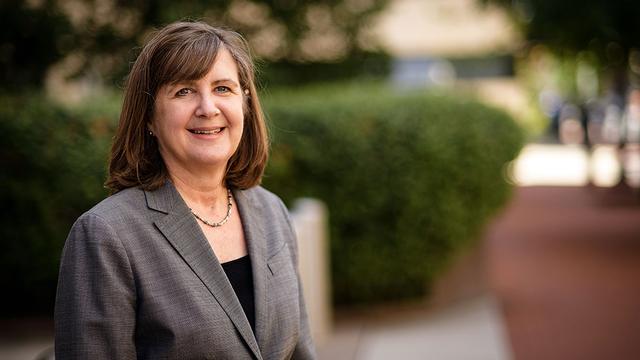Photo: Sam Levitan
Interview by Carmen Peota
Are we getting our money’s worth? If the question is about the nearly $4 trillion the U.S. government spends each year, then Humphrey School alumna Kate Siggerud (MPP ’87) is one to answer.
Having spent her career at the Government Accountability Office (GAO), she’s had both a close-up and a bird’s-eye view of government for three decades.
“I’ve had exposure, at least in some way, to every activity of the federal government,” she says.
The GAO is an independent, nonpartisan agency that works for Congress, investigating whether federal agencies and programs are effective and efficient.
“Our job is to help the Congress carry out its oversight,” she explains.
Siggerud started as an analyst at the agency’s Chicago field office just after earning her master’s degree in public policy in 1987. She has now risen to one of the GAO's top jobs, chief operating officer, and is a member of the agency's executive committee. As COO, Siggerud oversees all of the 700 to 800 reports GAO generates each year.
Here she shares some of the insights she’s gleaned during her career.
Is our government better or worse than people think?
My view is that the federal government is full of dedicated employees. Nevertheless, there are programs that could be more effective and efficient.
What fuels the perception that government is wasteful and inefficient?
Although most agencies work day by day to carry out what they’re expected to do by law and serve the American people, they may not get a lot of attention because they’re doing what they’re supposed to do. But poor performers get rightful attention. The GAO tells the stories of all of the organizations, whether they’re hot-button and in the news or have a lower profile.
Who decides what the GAO will investigate?
The GAO has a set of protocols for working with the Congress. We place priority on requests from committees that have jurisdiction over the topic that is being tasked. We also place priority when a law that is passed instructs us to do a review or issue a report. We stay out of areas that are in active litigation or under investigation.
Do politics affect that?
The kinds of requests we get can change from one Congress to the next, but less than you might think because we have a commitment to serve both the majority and minority parties, regardless of the outcome of an election. The types of requests are more influenced by whether there is a perceived problem or if a program needs to be reauthorized. And things that are happening in the country influence where Congress wants to conduct oversight. For example, after last year’s hurricanes and wildfires, we received requests regarding disaster response by the federal government. I would say it’s more cyclical than political.
What programs are under the microscope now?
We’re getting a lot of requests about Veterans Affairs programs with regard to wait times for appointments and the health care that veterans are receiving. We always receive requests regarding defense programs, especially when they are being reauthorized, which just occurred. And Congress is very concerned about cybersecurity right now. Five or six years ago that wasn’t as much in the forefront.
What GAO work has the biggest impact?
The GAO issues a high-risk report in every odd year to coincide with the beginning of a new Congress. This pulls together our work from previous years and identifies areas where there’s the most risk for fraud or mismanagement, or where there’s a need for fundamental transformation. We view that as GAO’s advice to each new Congress; it’s where Congress should or could focus its oversight activity. Over the years, the GAO’s work has resulted in billions of dollars in savings from this and other reports.
How did the Humphrey School prepare you for your career?
I learned about research methods and policy evaluation. Also, we focused on writing—clearly, for decision makers, and with bottom-line messages. In addition, the values that Humphrey instilled—about speaking truth to power and the importance of making decisions based on facts, objectivity, and using information in managing the government—are similar to what we hold as important at the GAO.
What are your strengths as a leader?
I’m a good listener. I try to probe to understand what people are saying and how they’ve reached a conclusion. And I’m a fairly calm person. Working for the federal government or the Congress can be a pressure cooker. I generally don’t get too ruffled.
Carmen Peota is a freelance writer and editor in Minneapolis.


